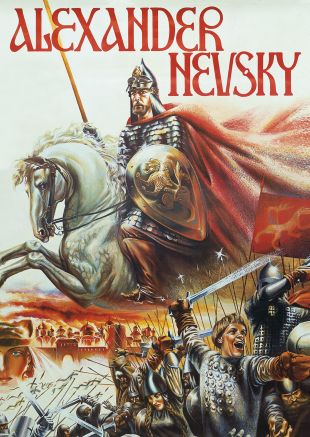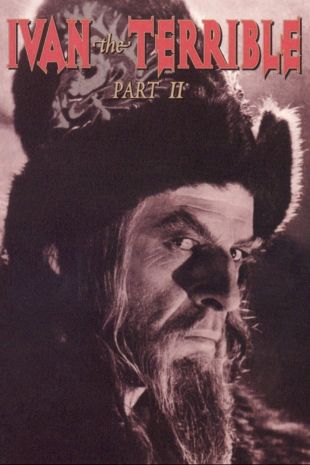It is somewhat ironic that this composer, who was censured in 1948 along with fellow composers Dimitri Shostakovich and Aram Khachaturian for supposedly "formalist tendencies," should have died on the same day as his oppressor Joseph Stalin. Prokofiev's wide-ranging imagination encompassed the absurd (The Love of Three Oranges, "Lieutenant Kije"), the historically romantic (Alexander Nevesky, Eugene Onegin), the childlike (Peter and the Wolf), and the expansively lyrical (the piano concerti and sonatas, Romeo and Juliet, etc.). His rich orchestrations, modal melodies, and lush harmonies provide a wealth of material for filmmakers to draw upon.
Director Jean-Pierre Brossman's complete 1989 production of The Love of Three Oranges (1989) is an imaginative staging of Prokofiev's original opera (Op. 33, 1921). The libretto is based on the well-known fairy tale of a melancholic young Prince who can only be cured by laughter. Despite a jester's efforts, the Prince only laughs when the witch Fata Morgana accidentally trips in a prat-fall. Her curse causes the Prince to fall in love with three oranges. After many adventures, the oranges are recovered and one of them contains Princess Ninetta whom the Prince marries. The French production has spare staging, designed by Jacques Rapp, and movable walls which conceal and reveal in a very elegant manner. (This opera seems to provide an occasion for designers to let their imaginations run wild -- one sensational live production by Richard Jones at the Opera North in 1988 featured scratch-and-sniff cards with "microfragances" for the audience, à la filmmaker John Waters' outrageous comedy Polyester [1981].)
The gentle but lively cornet theme of Kije's Wedding from Prokofiev's Lieutenant Kije: Symphonic Suite, Op. 60 is heard briefly during the scene of a book signing at "New York's only remaining real book store" in Crossing Delancey (1988). The theme returns later in its longer version as Isabelle (Izzy) Grossman's interfering grandmother Bubbie and a matchmaker try to set her (Amy Irving) up with a local boy (Peter Riegert as the pickle man). Prokofiev wrote his music originally for Fajntsimmer's film Poruchik Kizhe (1933), the satirical tale of a soldier who never existed. Excerpts from the suite are also heard in The Horse's Mouth (1958) and Doc Hollywood (1991).
One of Prokofiev's most popular works has been the charming children's tale Peter and the Wolf with its delightful characterful leitmotifs played by specific instruments around the tale recited by a narrator. Many actors and other personalities (including politicians and non-artist public figures) have been involved in concert and media productions of this modern classic. Among the television and film versions and adaptations have been Art Carney Meets Peter and the Wolf (1959 for TV); the wonderful but not often seen animated Disney film Peter and the Wolf (1946) with Sterling Holloway as the narrator; the imaginative television drama/musical Peter and the Wolf: A Prokofiev Fantasy (1994) with Roy Hudd as Sergei Prokofiev and Sting as the narrator; the television production Peter and the Wolf (1996) with Kirstie Alley, Lloyd Bridges, and Ross Malinger; Make Mine Music (1946); and A Christmas Story (1983).
Approximately 45 other feature-length productions quote music by the composer originally written for other purposes. Prokofiev himself can be seen in The Secret Life of Sergei Eisenstein (1987) which contains archive footage of the composer at a piano with filmmaker Sergei Eisenstein for whom he wrote the score to both parts of the film classic Ivan the Terrible, and the television special Disneyland: The Fourth Anniversary Show (1957) which featured a personal appearance by Prokofiev.


